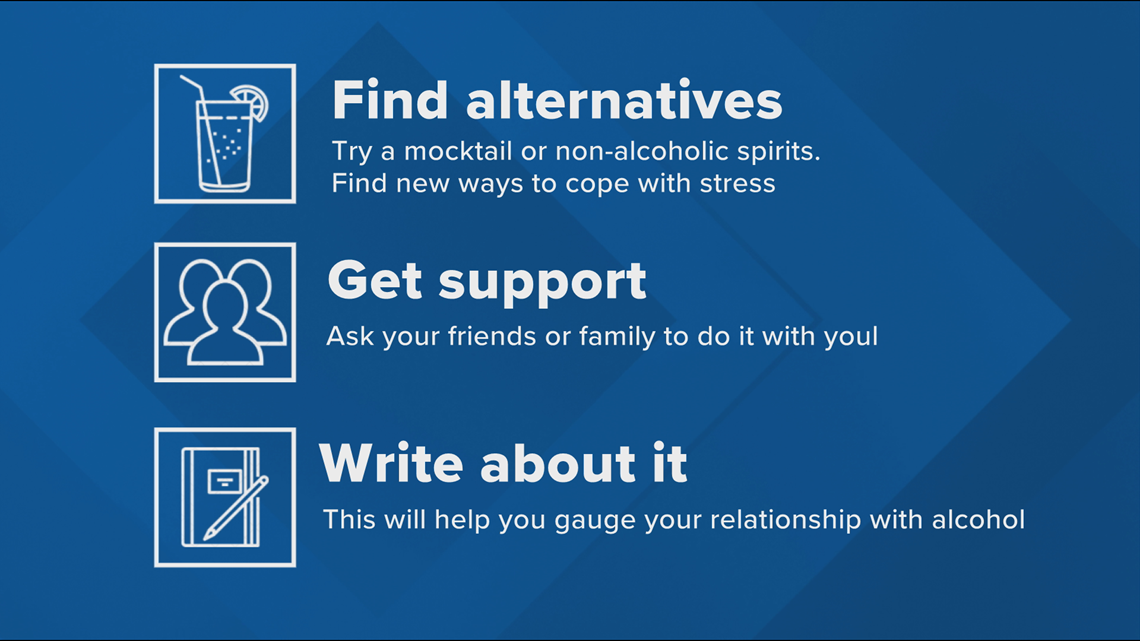KNOXVILLE, Tenn. — 2020 was a stressful year for so many people -- from a global pandemic, financial hardship, and job loss to a contentious presidential election -- and many people turned to alcohol to cope with anxiety and loneliness.
Now that 2021 is here, some people are participating in “Dry January." It's a trend where people voluntarily give up drinking to start the new year feeling clear and refreshed.
Dr. Patrick Jensen, MD, a board-certified psychiatrist with Covenant Health, said a sober period also has long-term health benefits.
He said problematic alcohol use or even daily alcohol use can have harmful effects on the liver, for example.
“We do know that over several years of daily or chronic alcohol use, people can develop hepatic problems, so taking a break will help your liver to a certain degree,” Jensen said.
He added that there are also some mental health benefits to not drinking.
“Alcohol has all kinds of effects on the brain, such as sedation. It can slow down your reflexes and your speed of thinking,” he said. “And, of course, there could be a physiological dependence on alcohol. People can develop withdrawals to abrupt cessation.”
“Taking time away from alcohol will mitigate or help prevent those kinds of adverse effects,” Jensen added.
Research does back the idea that a sober period can make you feel better.
Nearly 71% of people who participated in a sober January said they slept better, according to a study by the University of Sussex. That study also found that 67% reported having more energy, 58% lost weight and 54% said they had better skin.
In addition to physical and mental health, Jensen said pausing alcohol consumption also has social benefits. This includes consequences of alcohol like drinking and driving or legal issues.
“Sometimes alcohol can cause more interpersonal problems because it can lead to more impulsivity in your relationships,” Jensen said. “You might do or say things you might not normally do or say because you are under the influence of alcohol.”
Some background
Dry January began in 2012 as an initiative by the British charity Alcohol Change UK to help people create healthier long-term drinking habits.
And it worked. Alcohol Change UK said research shows that even six months after Dry January, 70% of people changed to healthier drinking habits.
“It helps us learn the skills we need to manage our drinking. That means that for the rest of the year we are better able to make decisions about when we drink and how much, so we can avoid slipping into drinking more than we really want to,” Alcohol Change UK said on their website.
It's not all or nothing
This isn’t an easy task, especially with what has been going on in the world. But one important thing to remember: it’s not all or nothing. The goal is to drink more consciously, even if you choose not to give up alcohol altogether.
Here are some tips to help you have a successful Dry January.
- Find other ways to cope with stress: Jensen said this is important especially if you are one of the people who has felt like they increased their drinking during the pandemic. This could mean finding a hobby that you enjoy, exercise, or other relaxation methods like meditation or yoga.
“People who have been coping with alcohol need to find a different coping strategy,” Jensen said. “Coming up with very effective strategies to cope with anxiety and stress can be helpful in being successful,” he added.
- Find a substitute: Fill your glass with some sparkling water or try non-alcoholic beer or spirits and make a mocktail.
- Get support: Ask your friends and family to do Dry January with you. This will keep you all accountable and give you a group of people to talk about it with.
- Write about it: One of the main goals of Dry January is to promote more conscious, healthier drinking habits even when the month is over. Writing about your experience can help you gauge your relationship with alcohol. For example, if you notice you are drinking more frequently, maybe it's time to consider talking to your doctor.


Something to note: If you are someone who already has an alcohol dependence, Jensen said it's important to have a conversation with your doctor to make sure you are doing Dry January safely.
“They might have withdrawal symptoms if they try to abruptly stop,” Jensen said. “If anyone feels that they want to engage in a dry January, but felt they had some problematic alcoholic behaviors leading up to that time, they should come into the care of their physician to give them some advice about how to go about doing that just to make sure they’re safe.”

